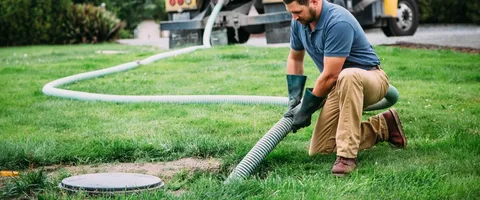Maintaining a properly functioning septic system is crucial for any household that relies on it. Whether you’re dealing with unexpected issues or planning regular maintenance, understanding the ins and outs of septic tank repairs is essential. In this comprehensive guide, we’ll cover everything you need to know about repairs for septic tanks, including septic tank location, common problems, and tips to keep your system running efficiently.
The Importance of Regular Septic Tank Maintenance
Septic systems play a vital role in managing household wastewater. Neglecting regular maintenance can lead to severe issues, including backups, foul odors, and even environmental hazards. Regular inspections and timely repairs can save homeowners from costly repairs and health risks. Let’s explore the common problems that require septic tank repairs and the steps you can take to address them.
Common Septic Tank Issues and Their Solutions
- Clogged pipes and drains: Over time, solid waste and debris can accumulate in your pipes and drains, leading to clogs. If you notice slow drains or gurgling sounds, it’s time to call a professional for septic tank repairs. Regularly pumping your septic tank can prevent clogs and keep your system functioning smoothly.
- Tree Root Intrusions: Tree roots can infiltrate your septic system, causing blockages and damage to pipes. If you suspect tree roots are affecting your system, a professional can use specialized equipment for septic tank location and repairing any damaged areas.
- Broken or Damaged Pipes: Pipes can break or become damaged due to shifting soil, heavy machinery, or age. If you notice wet spots or sewage smells in your yard, it could indicate a broken pipe. Prompt repairs to septic tanks are essential to prevent further damage.
- Tank Overflow or Backup: If your septic tank overflows or backs up into your home, it’s a clear sign that repairs are needed. This issue can be caused by a full tank, clogs, or damage to the tank itself. Immediate action is required to prevent health hazards and property damage.
Septic Tank Locating: Why It’s Crucial
Before any repairs to septic tanks can be made, it’s important to locate the tank accurately. Septic tank locating is the process of finding the exact position of your septic tank and its components. This is crucial for several reasons:
- Efficient Repairs: Knowing the precise location of your septic tank allows professionals to perform repairs more efficiently, reducing the time and cost involved.
- Preventing Damage: Accurate locating helps avoid unnecessary digging and potential damage to your yard or other underground utilities.
- Planning Maintenance: Regular maintenance tasks, such as pumping and inspections, are easier to perform when the tank’s location is known.
Steps for Septic Tank Locating
- Consult Property Records: Your property records may include a septic system layout, showing the tank’s location. This can be a useful starting point.
- Visual Inspection: Look for signs such as manhole covers, access ports, or areas of lush vegetation, which can indicate the presence of the septic tank.
- Professional Equipment: Professionals use specialized equipment like ground-penetrating radar (GPR) and electronic locators to pinpoint the exact location of your septic tank.
DIY vs. Professional Septic Tank Repairs
While some homeowners may attempt DIY repairs for septic tanks, it’s often best to leave these tasks to professionals. Here’s why:
- Expertise and Experience: Professionals have the knowledge and experience to diagnose and fix issues accurately and efficiently.
- Safety Concerns: Handling repairs for septic tanks involves dealing with hazardous materials. Professionals are trained to manage these safely.
- Long-Term Solutions: Professional repairs are more likely to provide long-term solutions, preventing recurring issues and ensuring your system’s longevity.
Tips for Maintaining Your Septic System
Regular maintenance is key to avoiding major repairs for septic tanks. Here are some tips to keep your system in good shape:
- Regular Pumping: Have your septic tank pumped every 3-5 years, depending on usage and tank size.
- Water Conservation: Reduce water usage to prevent overloading your septic system. Fix leaks and use water-efficient appliances.
- Proper Disposal: Avoid flushing non-biodegradable items, grease, or chemicals down the drain. These can cause clogs and damage your system.
- Routine Inspections: Schedule regular inspections to catch any issues early and ensure your system is functioning properly.
When to Call a Professional
Knowing when to call a professional for septic tank repairs can save you time, money, and stress. Here are some signs that it’s time to seek professional help:
- Persistent Odors: If you notice foul odors around your home or yard, it could indicate a problem with your septic system.
- Slow Drains: Slow-draining sinks, toilets, or showers may be a sign of clogs or a full septic tank.
- Sewage Backup: Any sign of sewage backup inside your home requires immediate attention from a professional.
- Unexplained Wet Spots: Wet or soggy spots in your yard, especially near the septic tank area, can indicate leaks or overflow issues.
Conclusion
Maintaining a healthy septic system is essential for every homeowner relying on this crucial infrastructure. Regular inspections, timely repairs, and professional assistance can ensure your septic system functions smoothly and efficiently. By understanding common issues and knowing when to call in the experts, you can avoid costly repairs and protect your home and environment.
For reliable septic tank repairs and professional assistance, contact Sep-Tech today. Our team of experts is ready to help you maintain a healthy and efficient septic system.
